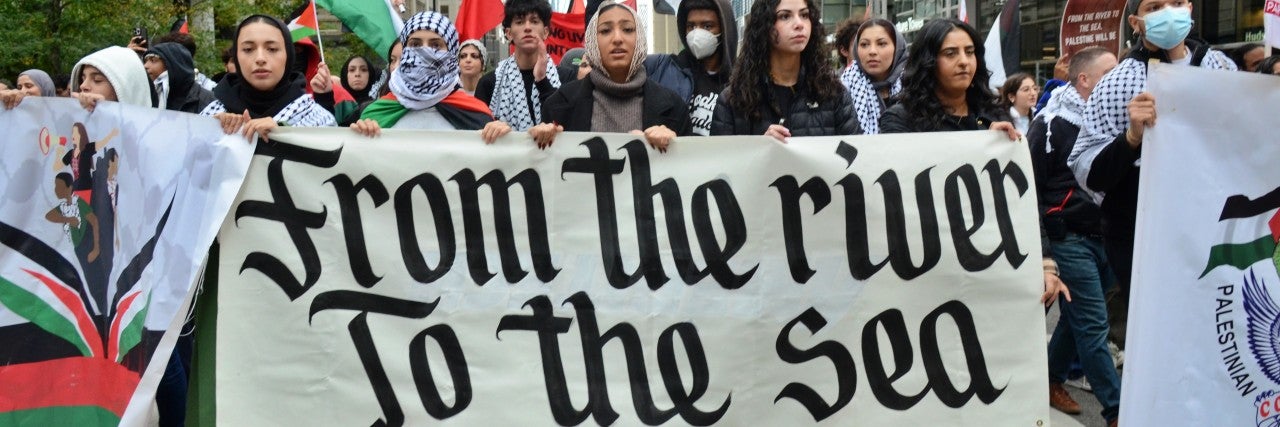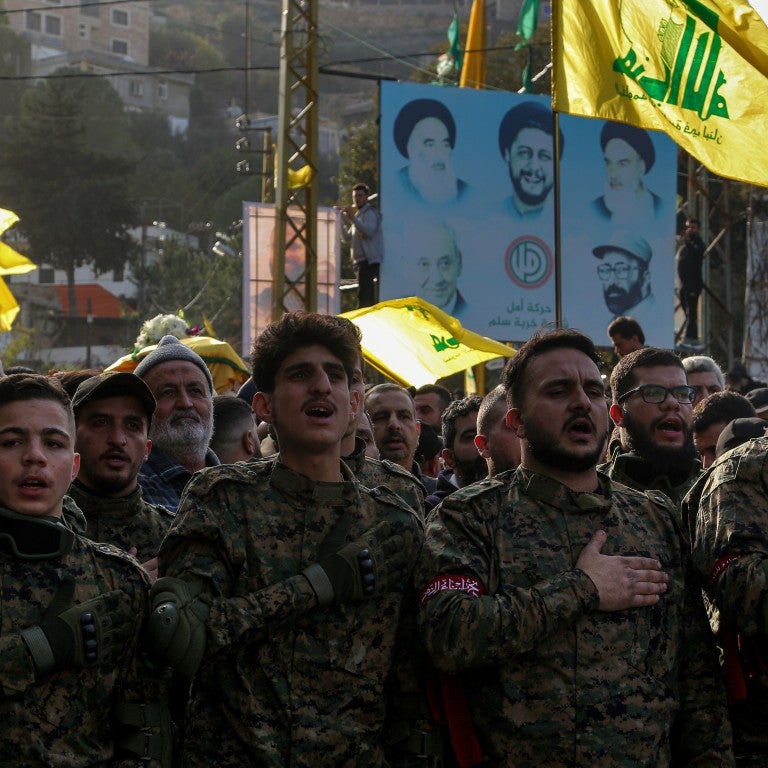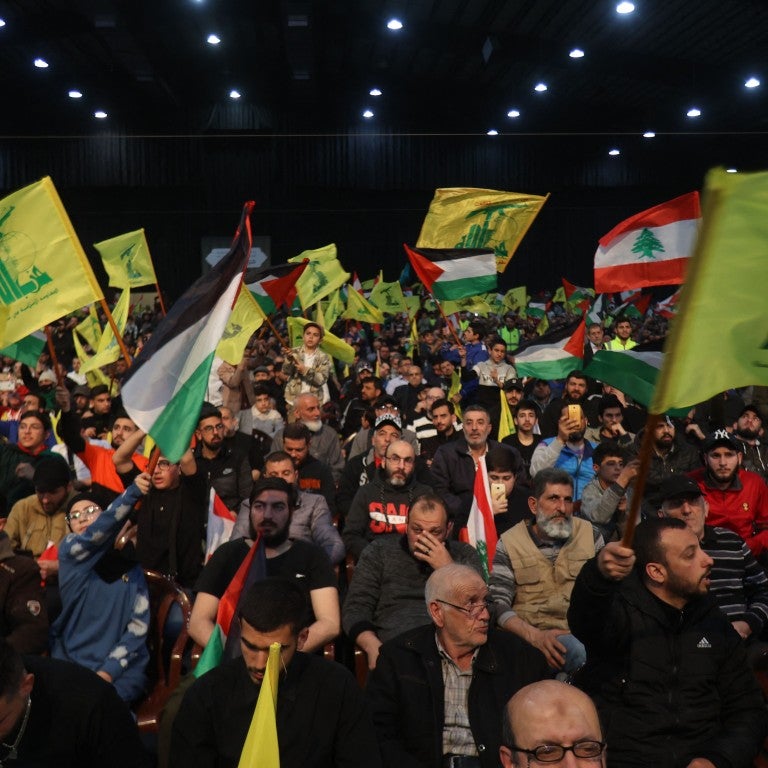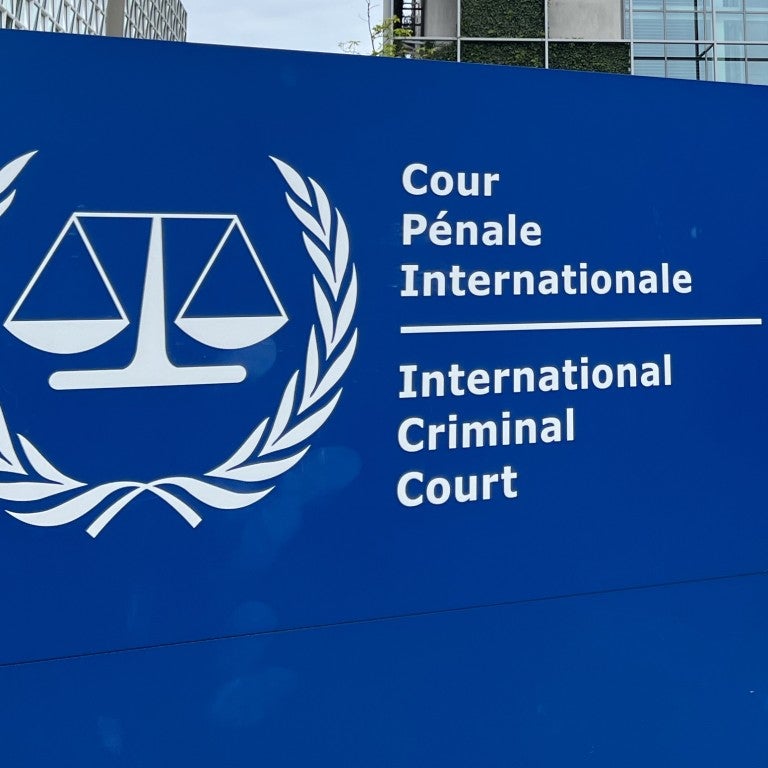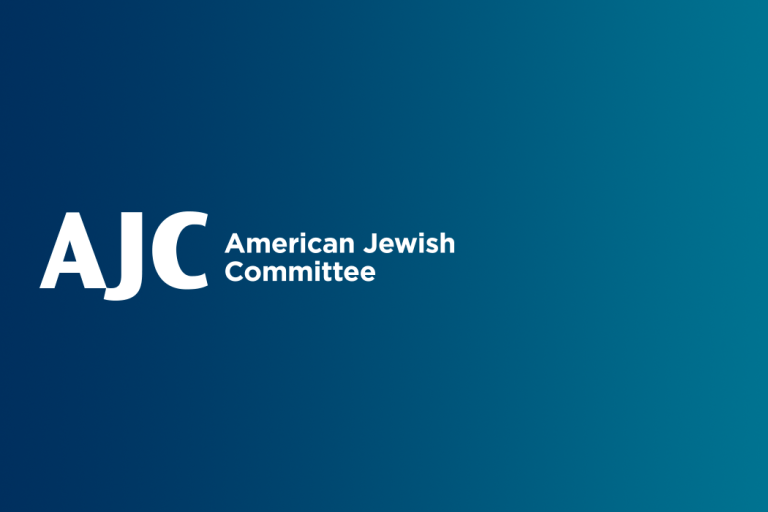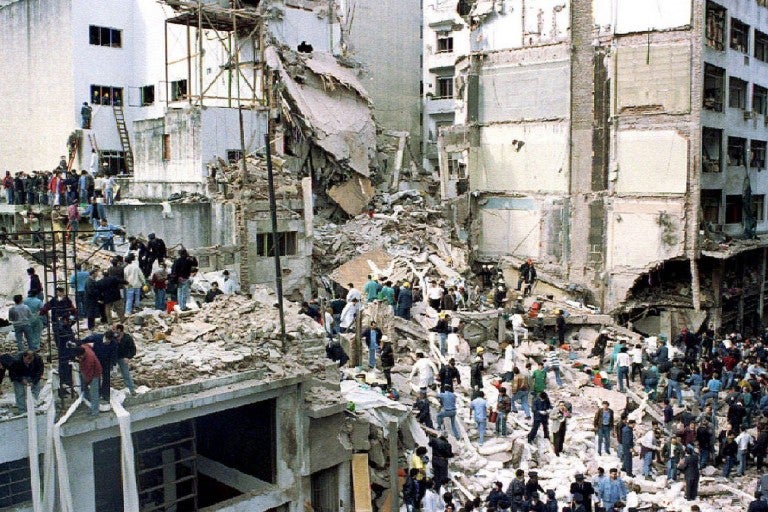November 9, 2023
As Israel continues to defend itself against the terrorist group Hamas, a war of information is unfolding around the world.
Major influencers on social media, as well as elected officials and mainstream media news and pundits, have amplified Hamas’ messages and presented those messages “pro-Palestinian.”
This mix of slogans and threats has infiltrated college campuses and even the halls of government.
Here are seven hateful and harmful slogans that Hamas and its supporters have unleashed, and many of those supporting Palestinians in America have spread.
- “From the River to the Sea”
Here’s what it means: “From the River to the Sea, Palestine Will Be Free” is the catch-all phrase symbolizing Palestinian control over the entire territory of Israel’s borders, from the Jordan River to the Mediterranean Sea. That means it is a call for erasing the State of Israel and the Jewish people who live there. It is also a rallying cry for terrorist groups and their sympathizers to do the same.
There is of course nothing antisemitic about advocating for Palestinians to have their own state. AJC itself is an organization that believes in a two-state solution to end the Israeli-Palestinian conflict. However, calling for the elimination of the Jewish state, praising Hamas or other entities who call for Israel’s destruction, or suggesting that the Jews alone do not have the right to self-determination, is antisemitic.
Here’s how it is being used: The hateful slogan has frequently appeared on protest signs nationwide during rallies in support of Palestinians, often used on social media by Palestinian supporters including government officials and members of Congress, and even on T-shirts for sale on Amazon. It has also become popular among far too common call-to-arms for anti-Israel activists on campuses across the country, including on the East Campus bridge at Duke University, on lecture slides at the Society for Ethnomusicology’s annual meeting, and scores of other academic spaces.
- “Colonialist Enterprise”
By charging Israel with colonizing Palestinians, Hamas and its supporters are manipulating the cause of racial justice to advance their terrorist goals - all while hoping no one notices Israel has been the homeland of the Jewish people for more than 3,000 years.
Hamas wants Americans and Europeans to think the conflict between Israelis and Palestinians is a racial one, in which Israelis are seen as European and white oppressors and colonizers and Palestinians are seen as people of color who are oppressed and colonized. But the conflict is not a racial one. It’s a conflict between two nationalities.
What it means: The term “settler colonialist” refers to a system of oppression in which a colonizing nation displaces and dispossesses a native or pre-existing population. It suggests the intention to replace or even eliminate an indigenous people.
Why it’s a false charge: When you are indigenous, it’s impossible to colonize yourself. And yet that’s what Hamas is contending about Israelis. The Jewish people have a 3,000-year connection to the land of Israel. The Roman Empire destroyed the Jewish state of Judea in 70 CE and expelled many of the Jews living there, but even in exile, the Jewish people always longed to return to their homeland. Still, Jews continued to live in the land of Israel. The Zionist movement of the late 19th century gave Jews outside of Israel the hope and ability to begin to return to live there.
Far from colonizers, Jews returning to their ancestral homeland fled persecution. This includes not only Jews from Europe, but also Jews from the Middle East and North Africa (Sephardic/Mizrahi Jews) who make up over half of Israel’s population today. These Jewish communities fled or were expelled from Arab countries and Iran due to antisemitism and persecution in the mid-20th century.
- “The Struggle for Al-Aqsa”
Here’s what it means: Hamas is abusing the spiritual significance of an Islamic holy site in order to incite and justify violence against Israel and Jews. Hamas called its October 7 massacre “Operation Al-Aqsa Flood,” implying that the terrorist group’s beheadings, murders, rapes, and hostage-taking against Israel were in defense of the Al-Aqsa Mosque, which sits on top of the Temple Mount in Jerusalem, and is the third holiest site in Islam. The Temple Mount is the holiest site in Judaism and the location of the two former Jewish temples that were destroyed.
This notion of a Muslim struggle for access to Al-Aqsa has also made its way to the U.S. On October 28, a protest in Crown Heights, one of the most densely populated Jewish neighborhoods in New York City, branded itself as “Flood Brooklyn for Gaza,” mirroring the name that the terrorist group has used for its recent attacks.
Unpacking the context: The Israel-Palestinian conflict is not a religious battle between Muslims and Jews. It is a conflict between two nationalities. In fact, Israel has long respected the rights of Muslims to pray freely at the Al-Aqsa Mosque or anywhere else. In the hours after Israel gained control of the Temple Mount in Jerusalem during the 1967 Six-Day War from Jordan, Israeli general Moshe Dayan famously said: “We have returned to the holiest of our places, never to be parted from them again….We did not come to conquer the sacred sites of others or to restrict their religious rights, but rather to ensure the integrity of the city and to live in it with others in fraternity.”
The rallying cry for decades of Palestinian terrorism against Israelis includes the false claim that Israel’s government has seized control of the Temple Mount to eliminate Muslim prayer rights in favor of Jewish prayer. Palestinian terror groups such as Hamas, Palestinian Islamic Jihad, and others like the Al-Aqsa Martyrs Brigade have abused the spiritual significance of the holy site as a means to incite violence against Israel.
- “Genocide of the Palestinians”
By definition, the Palestinians are not experiencing genocide. Claiming that Jews are perpetuating such genocide is gaslighting a community whose population numbers have still not exceeded pre-Holocaust levels. Furthermore, the Palestinian population, both in the West Bank and Gaza, has increased exponentially since the UN voted to establish a state for the Jewish people in the land of Israel.
If there is any genocidal intent in this conflict, the aforementioned slogan and threat “from the river to the sea” exposes it on the Hamas side. The goal of Hamas is to wipe Israel and Jews off the map.
Israel’s military operation to defend itself after Hamas’ October 7 atrocities, has been accused by thousands of artists, activists, and politicians, of carrying out genocide against the Palestinians. The accusations of genocide pervade the scholarly discourse, social media, and the vitriol of anti-Israel protesters.
What is genocide: The use of the term "genocide" is subject to legal definitions and should be used carefully and judiciously. Genocides aim to wipe out targeted religious, ethnic, or other groups.
While recognizing that the displacement of Palestinians in 1948 was a deeply painful moment in Palestinian history and identity, it also must be viewed from the prism of the war of Arab nations that attempted to destroy the Jewish population upon the acceptance of the UN’s 1947 Partition Plan.
Israel goes to unprecedented and extraordinary lengths to prevent civilian casualties: Since October 7, Israel has taken, and is continuously taking, several important steps to prevent harm to Palestinian civilians. Hamas, on the other hand, has not only deliberately killed and kidnapped civilians in Israel, but has also deliberately put Palestinian civilians in harm’s way, making it extremely difficult for Israel to effectively protect innocent lives.
For example, the Israeli military sends warnings to Gazans before its airstrikes on terrorist infrastructure in the coastal enclave. Meanwhile, Hamas typically places Palestinian civilians directly in the path of the IDF’s targets — not only aiming to protect terrorist leaders and their property but also to drive up death counts of Palestinians as they vie for leverage in the public opinion war.
Despite this, for over 75 years, Israeli leaders have tried time and time again to make the dream of peace a reality.
- “Glory to our martyrs”
Another antisemitic rallying cry is “glory to our martyrs” which is a phrase used to praise terrorists that beheaded, murdered, burned, raped, and kidnapped Israelis on October 7. Those who use it are signaling their support for the actions of the antisemitic terrorist group Hamas.
Unpacking the context: Praising martyrs and endorsing their terror has been promoted within Palestinian society. In fact, the “military” wing of Hamas, is named the Izz ad-Din al-Qassam Brigades, after Izz ad-Din al-Qassam, a Syrian Muslim preacher who formed the Black Hand in 1930 who carried out attacks against British, French, and Jewish targets and urged his followers to embrace martyrdom.
But this isn’t just limited to Hamas, the Fatah-controlled Palestinian Authority, which governs portions of the West Bank does the same thing. This includes naming squares and streets after terrorists who have killed Israelis. For example, the Palestinian Authority named a square in Jenin after terrorist Khaled Nazzal, who massacred 22 children and 4 adults in Ma’alot Israel in 1974, and a square in el-Bireh named after Dalal Mughrabi, who led the 1978 Coastal Road massacre which killed 37 Israeli civilians and an American.
Alarmingly, this glorification of terrorists is now occurring on U.S. college campuses.
- “Gaza is an open-air prison”
This phrase is used to convince people that Israel is keeping Gazans prisoners and that living conditions in Gaza are inhumane due to Israel’s actions. This claim is part of a larger effort by detractors to criticize Israel’s human rights record by accusing it of collectively punishing the Palestinian people.
Why it’s a false charge: Those who use this claim often conveniently ignore two important points: that Israel ceded control over Gaza in 2005 and that Israel isn’t the only country that borders Gaza.
In 2005, Israel unilaterally disengaged from Gaza, and in 2007, Hamas took control. With the funding it receives from international aid, Hamas could have built infrastructure, health care, and education systems for its population. Instead, it has created rockets and tunnels to attack Israel, turning Gaza into a wasteland and keeping the Palestinian population in poverty.
Meanwhile, Hamas leaders siphon billions of dollars in aid for personal enrichment. For the past 18 years, Israel has had little role in the day-to-day well-being of Gazans; that responsibility is on Hamas, which has failed the Palestinian citizens who hoped for peace and prosperity.
Additionally, Egypt also shares a border with Gaza, controlling who can enter Egyptian territory from Gaza. Egypt, like Israel, also maintains a security fence and blockade around Gaza to prevent terrorists from smuggling and infiltrating into its territory, not to keep anyone in a “prison.”
Though Israel had little control over what happened in Gaza, until the October 7 massacre, Israel had steadily worked to improve the situation for Gazans. Israel has issued over 17,000 work visas for civilians in Gaza to work in Israel, which provides an economic lifeline for Gazans since the salaries are significantly higher in Israel. Israel has also supplied a plurality of Gaza’s electricity needs and humanitarian aid, often for free.
“Globalize the Intifada”
How it’s being used: Around the world, anti-Israel activists have gathered for demonstrations and have called to “globalize the Intifada,” a common chant at protests in support of the Palestinian people. There are endless examples such as at a demonstration in Times Square, in front of the Consulate General of Israel in Manhattan, and even on Eastern Parkway in Brooklyn, not far from Crown Heights, a neighborhood with a very large Hasidic Jewish population that is the home of the Chabad-Lubavitch movement.
Here's what it means: This is a call for widespread violence against both Israelis and Jews worldwide.
The term "intifada" is an Arabic word that translates to "uprising" or "shaking off." It has been used to describe a series of Palestinian violent uprisings against Israel and policies in the West Bank and Gaza. There have been two intifada - the First Intifada from 1987-1990 and the Second Intifada from 2000-05.
It was during the First Intifada that the Palestinian terrorist group Hamas was born and issued its charter to eradicate the Jewish state. The Second Intifada was characterized by widespread protests, demonstrations, suicide bombings, and armed confrontations between Israeli security forces and Palestinian terrorists.
The Second Intifada resulted in a high number of casualties on both sides, with close to 1,000 Israelis killed or injured by Palestinian terror attacks. Infamous suicide bombings by Hamas during the Second Intifada include the Passover Massacre, which killed 30 civilians at a hotel, and the Dolphinarium Discotheque attack at a nightclub, leaving 21 Israelis dead, including 16 teenagers.
With the dramatic spike in antisemitic attacks on Jews around the world since the October 7 attacks by Hamas, calls for a global intifada are a call for further violence against Jews.
